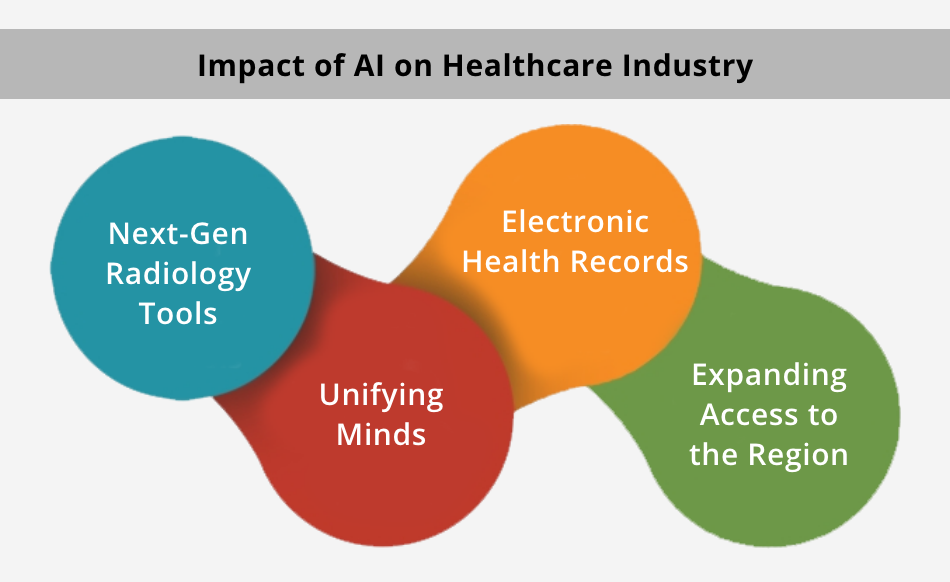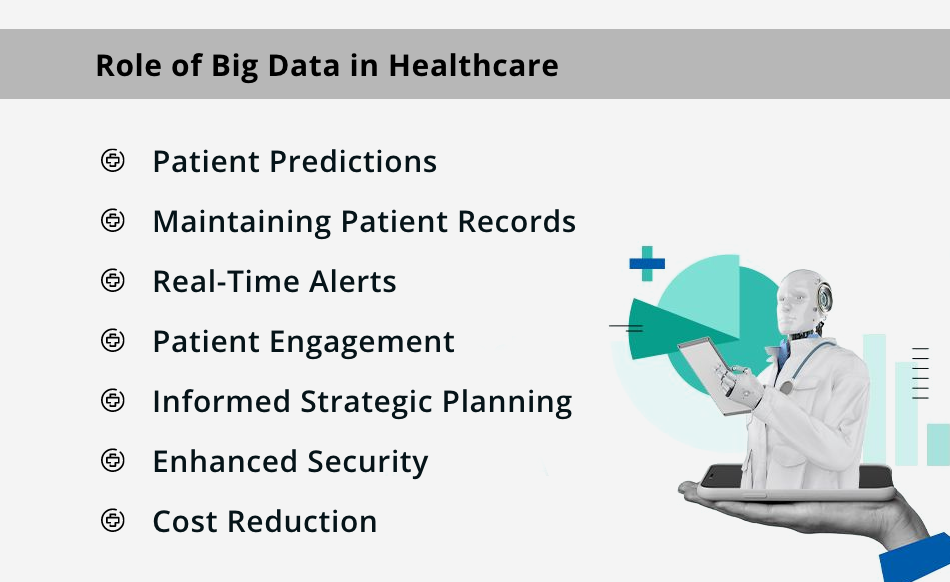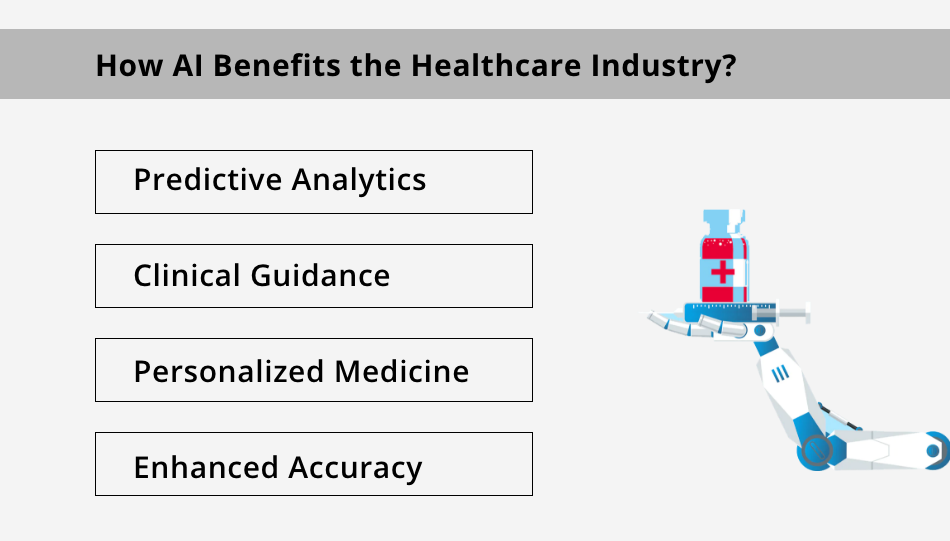Big data and AI in healthcare industry offer advantages in decision-making and treatment customization for patients.
Updated 3 May 2024

Director at Appventurez
The healthcare industry is booming at a faster rate and the dire need to attend to and manage patients is also getting increased. To curb such a situation, more new technologies are required and need to be implemented.
Big data and AI in healthcare sector have emerged as an intelligent blend of new-age necessities as both technologies offer advantages in decision-making and treatment customization.
With the integration of these advanced technologies in healthcare app development services, professionals gain invaluable insights into patient care, develop personalized treatment plans, and improve the overall efficiency of the process.
With their unique features and mechanisms, Big Data and AI are also making the healthcare domain extremely intelligent and making it accessible to every individual. In this blog, we will further explore the role of Big Data and AI in healthcare, and their transformative impact on the patient within the healthcare sector.
Big Data and AI in healthcare sector have emerged as a powerful tool with the potential to revolutionize the sector. They have become an integral component of modern healthcare systems, offering unprecedented opportunities to improve patient outcomes, streamline operations, and enhance the overall quality of care.
Big data analytics in healthcare carry a lot of importance in offering life-saving outcomes. In a simplistic language, Big Data technologies are used to store vast quantities of information created by the digitization of a system that further gets analyzed by specific technologies.
When used in the healthcare industry, Big data solutions use the health data of patients and help further prevent epidemics, costs, cure diseases, etc.
On the other hand, Artificial intelligence is what a human can do, perform, and say. When it comes to AI app development services in the healthcare domain, technology can simplify the tasks of both the patient and the doctors by performing various tasks.
Artificial intelligence in healthcare has the potential to offer data-driven clinical decision support to healthcare professionals and physicians. The ML technology also helps AI app development services to identify patterns, algorithms, and data for more precise automated insights for healthcare professionals.
While exploring the role of Big Data and AI in healthcare sector, it is important to understand the impact AI has on the industry.
With advanced artificial intelligence development services introduced in the healthcare sector, the industry is ensuring a more holistic approach to patient care. The points mentioned below will further explain the impactful role of AI in healthcare.

Computers are not just a means of communication but also a way to create direct interfaces between technology & the human mind eliminating the need for keywords, and monitors.
Moving to Traumas and neurological disorders- something that can take patients’ ability to move, speak, or interact properly with their surroundings. Thankfully, brain-computer interfaces (BCIs) made with the help of AI have the potential to restore fundamental experiences.
While comprehending the role of big data and AI in healthcare, the role of advanced AI can be understood from the latest technological trends. According to experts, the use of AI in healthcare can enable the next generation of radiology tools- detailed and accurate can replace the need for tissue samples in many cases.
Healthcare is something that works 24*7 and shortages of doctors can cause a severe threat to the lives of people. Now, when it comes to ultrasound technicians’ and radiologists’ limitations, it is a great threat.
Luckily, the implementation of AI in healthcare can mitigate the impacts of the deficiency of qualified staff by performing diagnostic duties. Diagnostic duties are meant to be done by humans only.
Just like the role of artificial intelligence in the retail industry, AI is considered the best asset for healthcare too. Its EHRs are considered the best known for playing a great role in the healthcare industry. But it does come up with its own set of issues.
To curb any kind of related issue, using Big Data and AI in healthcare, EHR developers are using AI to create more intuitive interfaces to automate repetitive and routine tasks.
Artificial intelligence is implemented in different forms in the healthcare industry. They help in enhancing efficiency and streamline the process to ensure seamless services to those in need.
It is a branch of AI that uses an algorithm to examine previous data, current information, and interactions that help to predict the most ideal treatment for the patients. Machine learning development services also play a key role in optimizing and streamlining healthcare procedures and administration.
While analyzing the role of both Big Data and AI in healthcare, artificial intelligence takes precedence with physical robots. Initially designed to deliver hospital supplies, the newly improvised versions of robots are able to collaborate with humans and can also be given training to perform any particular task.
It is a process of understanding and interpreting the text or language by a machine. Natural Language Processing services can help analyze the patient’s medical records and give suggestions to improve the quality of the methods used and prepare better results for the patients.
In healthcare, robotics process automation services are used to record early authorizations, update the patient’s medical records, and billing. It can even be used to extract data if we club it with other technologies like image recognition.
The integration of big data in healthcare application development services is essential to meet the growing demands of the healthcare industry. The growing role of big data services in healthcare industry can be understood from the points below:

One of the major concerns of healthcare professionals is to make a balance between how many workers should be made available at a given point in time. Hence, the integration of Big Data and AI in healthcare turns out to be beneficial in this stage.
Here, big data analytics in healthcare helps in solving such issues. With the use of predictive analytics in healthcare, professionals can gain predictions of how many patients are expected to come to the hospitals. The analysis allows researchers to understand relevant patterns in patients’ admission rates.
Big data in healthcare examples consists of Electronic health records. They are acknowledged as the second most widespread application of big data made in the healthcare domain.
Every patient has digital records that include medical history, test results, past diagnoses, demographics, and so on. These records are then shared via a secure information system that is made available to both providers.
A McKinsey report on big data and AI in healthcare states that “The integrated system has improved outcomes in cardiovascular disease and achieved an estimated $1 billion in savings from reduced office visits and lab tests.”
Real-time alerts are one of the major benefits of opting for big data and AI in healthcare sector. One of the best advantages of big data analytics in healthcare is timely real-time alerts. Clinical Decision Support (CDS) software intelligently analyzes medical reports at a given point in time and then forwards them to healthcare practitioners to let them make prescriptive decisions.
Wearable technology trends are the best way that easily collect patients’ health data accordingly and then send that data to the cloud storage. Additional information can also be accessed in the database, helping doctors to compare the healthcare data based on socioeconomic content. The data can be further modified for delivery strategies, further enhancing the future of big data in healthcare.
From healthcare professionals to patients, everyone’s interest has started in smart devices. Smart devices can record every step, heart rate, health monitoring, sleeping habits, walking distance, etc. daily.
Just like IoT in healthcare, Big data in healthcare industry allows strategic planning to gain insights into the patient’s health and motivations. Using the insights of patients’ health check-up results residing in different demographic groups, it becomes easy for healthcare professionals to understand what’s discouraging people from taking up treatments.
Using big data trends and informed strategic planning makes it streamlined to understand what arises as an issue for the patient. Once gaining such insights, figuring out solutions and ways becomes less challenging.
The Healthcare industry is more prone to 200% of data breach experiences than any other domain. Hence, big data and AI in healthcare play a key role in curbing this issue.
This situation can be prevented by big data analytics in healthcare. The analytics can prevent security threats by correctly identifying changes in network traffic and other cybersecurity issues. The Centers for Medicare and Medicaid Services said they saved over $210.7 million in fraud in just a year.
Big data in the healthcare sector is the best way to save a few bucks on hospitals when it comes to over or booking staff members. With the help of predictive analysis, getting a prediction of admission rates will help staffing allocations.
The points mentioned below explain the advantages of integrating big data services in the healthcare sector:
The world is witnessing an increased use of AI in healthcare to diagnose skin, liver, and heart diseases. The early diagnosis of such diseases can help in the timely treatment of the patients.

Among one of the top tech trends in healthcare is the integration of big data and AI in healthcare industry.
AI algorithms can analyze vast amounts of medical data for accurate diagnosis of diseases at an early stage. Technologies like AI and cloud app development services allow healthcare professionals to process large amounts of data in comparison to on-premise tools.
The impact of predictive data analytics in healthcare can be seen in the form of early diagnosis of life-threatening diseases. AI can be used for predicting potential diseases based on genetic conditions, health records, and lifestyles of the patients.
Diseases processes and responses to treatments of humans vary as per their genetic, physiological, and behavioral conditions, however, big data and AI in healthcare can help with that.
AI in preventive healthcare can provide customized treatments and medicine plans for patients. This can be done by doing a comprehensive analysis of patients’ underlying genetic information, clinical records, and treatment outcomes to identify patterns and correlations, reflecting the responsible AI in healthcare.
AI in clinical data management helps doctors and health experts harness artificial intelligence to suggest suitable treatments for diseases and help doctors figure out the most preferable treatments.
Both big data and AI in healthcare are quite capable of transforming the whole healthcare domain into intelligent & automatic systems. In the coming years, with the advancement in technology & expertise, together the technologies will remain on the top, further enhancing the economic impact of AI in healthcare.
If you are looking to add big data and artificial intelligence in healthcare and are looking for support to get started, Appventurez is the right choice for you.
We have a team of experts who are proficient in both big data and AI development services and will sit with you to identify the areas where both technologies can be most beneficial while developing a healthcare app.
Q. How does big data work with AI in healthcare?
AI makes big data analytics simpler by automating and enhancing medical data preparation, data visualization, predictive modeling, and other complex analytical tasks that would otherwise be labor-intensive and time-consuming.
Q. Why is big data important in AI?
Big data is giving organizations the power to spot patterns and trends early and know how those trends will impact future performance. It's helping companies make better decisions by giving organizations more information about what could potentially happen in the future with greater likelihood.
Q. Is big data a part of artificial intelligence?
AI's ability to expertly work with data analytics is the primary reason why artificial intelligence and big data are now seemingly inseparable. AI machine learning and deep learning are pulling from every data input and using those inputs to generate new rules for future business analytics.
Q. What are the challenges of AI in Healthcare?
When it comes to applying AI in the healthcare industry, privacy is a significant concern. Patient data concerns consist of highly sensitive personally identifiable information such as medical history, payment information, and identity information, which is protected by regulation guidelines.
Q. What is the cost of implementing AI in healthcare?
AI implementation in healthcare often costs between $20,000 and $1,00,000. Healthcare firms may use artificial intelligence to simplify processes, cut costs, and ultimately provide patient care by working with a reputable AI development services provider.


Elevate your journey and empower your choices with our insightful guidance.

Director at Appventurez
Director and one of the Co-founders at Appventurez, Chandrapal Singh has 10+ years of experience in iOS app development. He captains client coordination and product delivery management. He also prepares preemptive requisites and guides the team for any possible issues on a given project.
You’re just one step away from turning your idea into a global product.
Everything begins with a simple conversation.